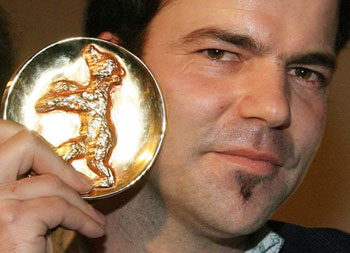|
Hanro Smitsman with his Golden Bear Award Hanro SmitsmanInterview by Rada Djurica Hanro Smitsman is a writer and director of film and television from the Netherlands. He has received multiple awards for his work. In 2005, Engel en Broer won Cinema Prize for Short Film at the Avanca Film Festival. In 2007, Raak (aka Contact) won the Golden Berlin Bear Award at the Berlin International Film Festival, the Spirit Award at the Brooklyn Film Festival, the first place jury prize for "Best Live Action under 15 minutes" at the Palm Springs International Short Film Festival, and the Prix UIP Ghent Award for European Short Films at the Flanders International Film Festival. In 2008, Skin won the Movie Squad Award at the Nederlands Film Festival. An actor in the film also won the Best Actor Award. It also won the Reflet d’Or for Best Film at the Cinema tous ecrans Festival in Geneva in the same year. This interview was conducted during the New Author Film Festival. How do you feel now, after you have won so many awards in such a short period? Well, it's great! But I don't really think about those things too much. I rather concentrate on my work. What I am thankful for is having been able to actually live from filmmaking. I feel very privileged in this sense. Why did you choose such an old subject [for Skin]? Such films were in fashion in the '70s and '80s. Why make it now in the 21st century? Do you think there is still the problem of skinhead Nazi supporters in Holland? The story of Skin is not about Neo-Nazi Skins but about the relationship between the oppressor and the oppressed. It's about a young boy who wants to be recognised by his father, who is a Holocaust survivor, emotionally marooned by memories of his past. His father who was once a victim, has become a tyrant to his family. So the son takes on the identity of his father's past oppressor. But the son has to pay a price for his new identity. I think the story is quite universal and is still very actual. Skin is about this mechanism: how being the oppressor or the oppressed is the same in the end. It is about the way violence is being transmitted. How was the film received with the European audience and the Dutch audience? Especially young people liked the film. They could very easily identify with the theme of the film. It didn't matter to them that the film was set in 1979. Why putting such a typical television film on the big screen? I always make films for the silver screen, and I wouldn't have known any way what would be the difference between shooting a film for television or for the big screen. The only difference is the money you get to make them. With films financed for television, you just get less money. Is your ambition to break through to the big screen now? I want to tell stories, and film just happens to be one medium I can use to do so. I don't care about the idea of "break though." I just want to continue my work as a story teller. Did you get money for this film from government, since the subject is very social? Every year, six feature films for television are financed by the government. Skin is one of them. What is your next project? I will be shooting my first real feature this summer. It's about a
group of friends who murder one of their own. It's about the scapegoat
mechanism.
|
